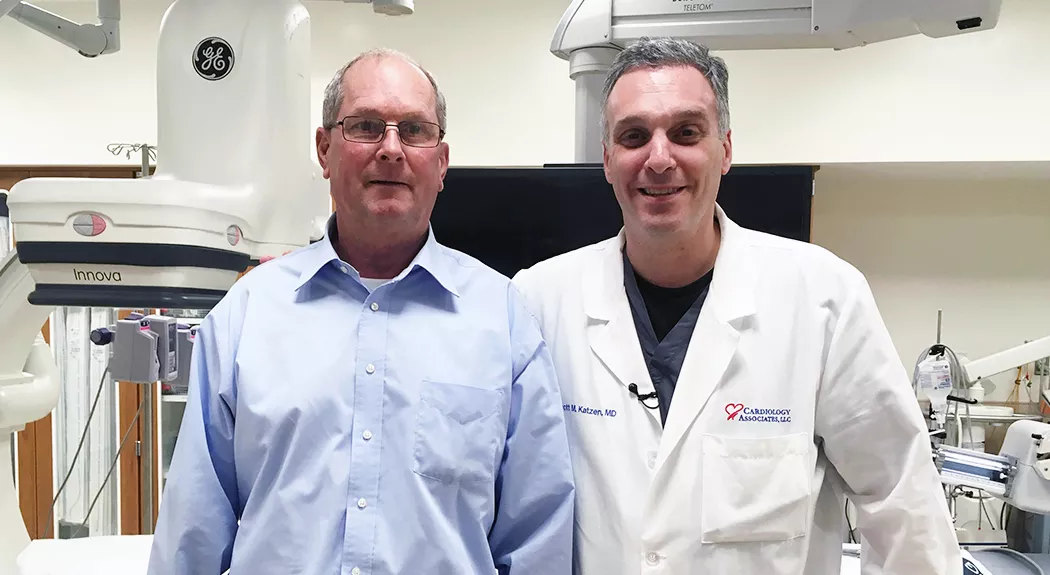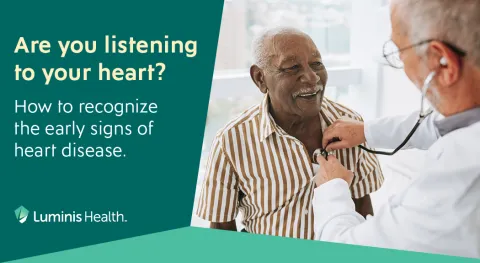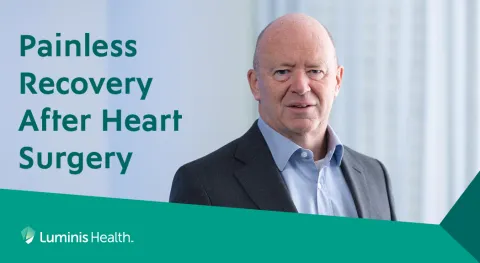
Roger Gaultney, who was treated for a heart attack at AAMC in September 2017, is pictured with Cardiologist Scott Katzen, MD, medical director of AAMC’s cardiac catheterization lab. Roger says the care he received from Dr. Katzen was unbelievable.
At first, Roger Gaultney thought the pain he was experiencing was acid reflux.
It was a warm day last September, and Roger, 62, had just come back from a dermatologist’s appointment. He was working in the yard of his Eastern Shore home, and began to feel sick and sweaty.
He drank a Coke — his usual remedy for acid reflux — but the pain began shooting up and down his arm.
He began to sweat so badly, it was as if someone had dumped water over his head. He struggled to breathe. He was sick to his stomach.
“I knew I was having a heart attack,” he says.
Roger’s wife called 911, and when the ambulance arrived, he asked to be taken across the Bay Bridge to Anne Arundel Medical Center. He says he knew he would be in good hands there.
Paramedics took him to AAMC’s Emergency Department where he was quickly taken to the cardiac catheterization lab. That’s where Cardiologist Scott Katzen, MD, the lab’s medical director, inserted a stent in the main artery behind Roger’s heart.
It was 100 percent blocked.
Dr. Katzen emphasizes the importance of “door to balloon” time – the amount of time it takes to unblock a cardiac patient’s artery after the patient arrives at the hospital.
“The goal is to have the blockage relieved and blood flow restored to the heart muscle in 90 minutes or less,” Dr. Katzen says. “Around 70 to 80 percent of the time, door to balloon time is an hour or less.”
Dr. Katzen performed Roger’s catheterization through the radial artery in his wrist, rather than the femoral artery in the groin. AAMC has been doing these types of catheterizations, which are less risky and more comfortable for the patient, since 2012.
Six months after the radial procedure, the scar on Roger’s wrist is barely noticeable.
A designated Chest Pain Center
AAMC is a designated Chest Pain Center, meaning a team of cardiologists is on call 24/7. AAMC cardiologists perform 1,200 cardiac catheterizations each year.
“We are seeing more and more cases of heart disease at the hospital,” says Cardiologist Jerome Segal, MD, medical director of AAMC’s Heart and Vascular services.
Dr. Katzen urges patients to learn the potential signs of a heart attack, which can go beyond just chest pain. For instance, patients should pay attention to any type of abnormal sensation in the chest. Shortness of breath is also a possible warning sign.
“If you feel something is just not right, seek medical attention,” Dr. Katzen says.
He reminds people that living a heart-healthy lifestyle — including eating right, exercising and not smoking — will greatly reduce the risk of developing heart disease.
Roger says the care he received from Dr. Katzen was unbelievable.
“It was like we’d known each other for years,” Roger says. “I really don’t have words to explain what that means to me.”
A new life
By all accounts, Roger was a healthy man prior to his heart attack.
He’s always been slender, and he keeps physically active in his job as a drywall finisher and by playing with his grandchildren.
His main health challenge prior to the heart attack was high cholesterol, though he points out that heart disease runs on his mother’s side of the family. His maternal grandmother died of a heart attack, and his mother had high blood pressure, as well as high cholesterol.
A month earlier, he’d gotten a physical that showed no signs of heart problems.
After his heart attack, Roger knew he was going to have to change his lifestyle. He now avoids red meat and dairy completely.
He’s also become more spiritual and says he is attending church more.
“My life is beautiful,” he says.
Roger urges others to make an appointment with the Heart Health Foundation’s Dare to C.A.R.E. About Vascular Disease heart health screening program. To get your screening at AAMC, call 410-573-9483, Ext. 200.



